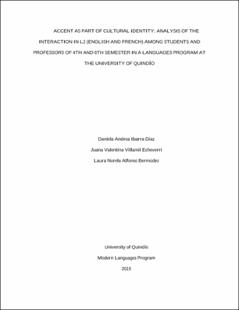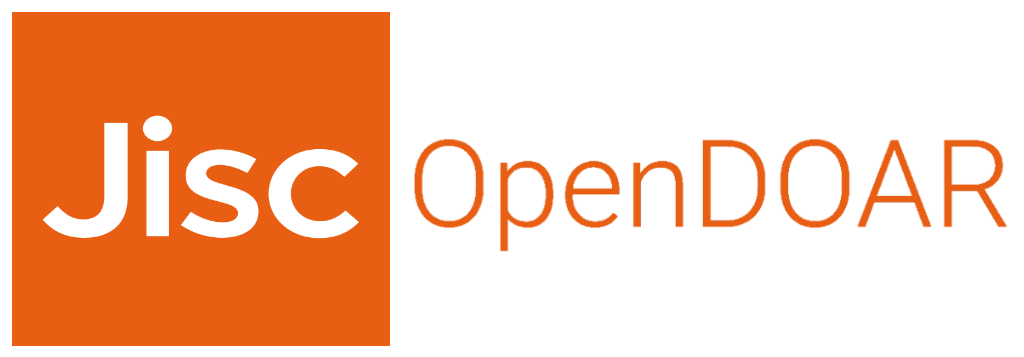Accent as part of cultural identity: analysis of the interaction in l2 (English and French) among students and professors of 4th and 6th semester in a languages program at the university of Quindío
Trabajo de grado - Pregrado
2018-12-05
Facultad de Ciencias de la Educación
This qualitative research provides insight into how the mother tongue’s accent present in
the L2 oral production entails the culture of the speaker and how this, in turn, is a sign of the
subject’s identity. This project was carried out within a languages program at the University of
Quindío. Two groups from 4th and 6th semester were observed at four different times to achieve
the purpose of the study. The interviewed population consisted of four professors and twenty
students who answered questions that inquired what their perceptions were concerning native-like
accent and L2 accented speech. Likewise, the data analysis showed that L2 accented speech was a
signature of the speaker’s identity and worldview. It also reflected that social stereotypes regarding
the mother tongue’s accent in the L2 production, was seen as something undesirable and necessary
to eliminate. This study concluded that although there were some subjects who considered L2
accented speech as a trait that had to be neutralized, the vast majority asserted that their mother
tongue’s accent was a symbol of who they were in the world Esta investigación cualitativa proporciona información sobre cómo el acento de la lengua
materna presente en la producción oral de L2, refleja la cultura del hablante y cómo esto, a su vez,
es un signo de la identidad del sujeto. Este proyecto se llevó a cabo dentro de un programa de
idiomas en la Universidad del Quindío. Se observaron dos grupos del cuarto y sexto semestre en
cuatro momentos diferentes para lograr el propósito del estudio. La población entrevistada estaba
conformada por cuatro profesores y veinte estudiantes que respondieron preguntas que indagaban
cuáles eran sus percepciones con respecto al acento nativo y el discurso acentuado en la L2. Del
mismo modo, el análisis de datos mostró que el discurso acentuado era una firma de la identidad
y la visión del mundo del hablante. También reflejó que los estereotipos sociales con respecto al
acento de la lengua materna en la producción de L2, se consideraban como algo indeseable y
necesario de eliminar. Este estudio concluyó que, aunque había algunos sujetos que consideraban
que el discurso acentuado en la L2 era un rasgo que debía neutralizarse, la gran mayoría afirmó
que el acento de su lengua materna era un símbolo de quiénes eran en el mundo.
Descripción:
Trabajo de grado
Título: Trabajo de grado.pdf
Tamaño: 1021.Kb
 PDF
PDF
 LEER EN FLIP
LEER EN FLIP
Descripción: Licencia
Título: 4 LICENCIA Y AUTORIZACIÓN.pdf
Tamaño: 280.0Kb
 PDF
PDF
Título: Trabajo de grado.pdf
Tamaño: 1021.Kb
 PDF
PDF
 LEER EN FLIP
LEER EN FLIP
Descripción: Licencia
Título: 4 LICENCIA Y AUTORIZACIÓN.pdf
Tamaño: 280.0Kb
 PDF
PDF


















